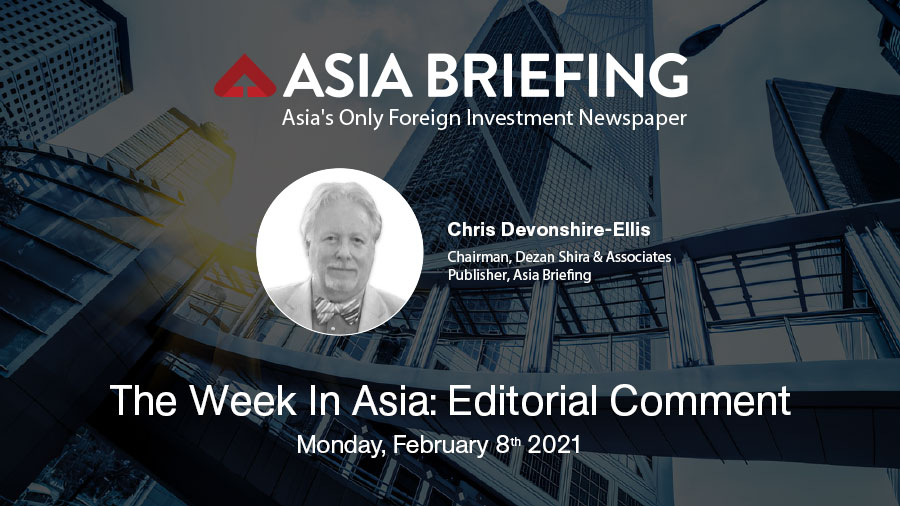
Op/Ed by Chris Devonshire-Ellis
The past week has seen events unfold that serve as adequate reminders of the risks inherent in business. A coup in Myanmar that no-one saw coming, continuing riots in Delhi, unease over China’s human rights record in Xinjiang, unhappiness in Hong Kong and a ‘robust’ exchange between the US secretary of State and China’s top foreign policy official Yang Jiechi have not helped make potential for any Asian regional post-Covid cooperation any easier. Blinken called out China for “its undermining of the rules-based international system.”
He might do better to look closer to home. At the same time, a growing, perhaps even more sinister trend has emerged, the rise of corporations acting as sovereign States. This has begun mostly in the United States itself, where corporations such as Facebook and Amazon have grown so powerful they are able to negotiate the terms of sovereign laws and taxes to their own advantage. Facebook has threatened to exit Australia should an elected, democratic Government not pass laws to its liking. With annual revenues of US$86 billion in 2020, Facebook claims it should be exempt from paying for content. Mark Zuckerberg meanwhile has announced plans for satellite launches.
Google, with revenues of US$13 billion, says the same as Facebook. Both have suggested that if Australian laws do not go their way, services provided to the Australian public will be ‘seriously damaged.’ They are running advertising
campaigns in the country to persuade Australian citizens any changes to the laws would be to their detriment. It is a new form of political bullying, carried out by American businesses in someone else’s country. It is American corporate undermining of an international rules-based system.
Amazon, whose head, the multi-billionaire Jeff Bezos stepped down as operational CEO last week, has a personal fortune estimated at US$186 billion. In the UK, as just one example, the company paid the equivalent of US$8.65 million in corporate income tax against revenues of US$17.86 billion. That’s an effective tax rate of 1.6%, and is another example of corporate bullying to ensure Governments reduce taxable overheads. Bezos also (and legally) cut healthcare benefits to 1,900 part-time staff in 2019. 12 months later, the Covid pandemic hit. How many of those 1,900 staff and their families were impacted by that?
These attempts to subvert laws and evade moral responsibilities are decidedly undemocratic and extremely unhealthy to sovereign nations fiscal balance sheets. They are also extremely unhealthy to specific individuals.
Meanwhile, deflecting attention away, from what are effectively US owned businesses plundering other countries, Washington beats up China about its Belt & Road Initiative, which mostly builds infrastructure. Elon Musk, another US billionaire rich from technology, also plays the game, with hardcore bargaining to obtain tax incentives that are unthinkable to other foreign investors.
The result? He wants to fly to Mars. By comparison, the CEO of the China State Construction Company, Yu Tao is more interested in building Ports. There is a serious disconnect here of where and how such money should be spent.
These are points that Vladimir Putin made recently, saying that certain US corporates “Are not just economic giants, in some areas they are already de facto competing with sovereign states.” Those remarks gained zero traction in the United States as being typical anti-US propaganda. Yet he is right, such corporations are an increasingly negative influence and are sucking up fiscal revenues that ought to be dispersed and reinvested among countries citizens. Elon Musk and Jeff Bezos childish dreams of becoming astronauts come at the expense of millions of taxpaying citizens around the world.
The average age of a US astronaut is 34. Men in their prime, fit, well trained and completely devoted to overcoming the fraught dangers of space travel. Elon Musk will be a pot-smoking 50 years old in June, while Jeff Bezos is 57. Mark Zuckerberg is 36 with a personal fortune of US$90 billion. That is more than the annual GDP of Sri Lanka, a country with a population of 20 million people. These types of people illustrate the worst excesses of capitalistic lunacy, with the net results being wasted on Captain Marvelesque ego projects. A major issue to be solved, post-Covid, is how to stop this.
Solutions could be many and varied and include the breakup of these companies and their power bases. Ethical investors should also start to examine whether the traits shown by these individuals and their corporate behaviour stand up to moral scrutiny.
The Australian Government is right to stand out and prevent these abuses from continuing much longer. It should not be acceptable for US corporates to dictate the laws and taxes they pay in other people’s countries.
Stay safe!
Best regards;

Chris Devonshire-Ellis
Chairman, Dezan Shira & Associates
Publisher, Asia Briefing
E: editor@asiabriefing.com
W: www.dezshira.com
Disclaimer
Any views or opinions represented in this blog are personal commentary, belong solely to the contributor and do not necessarily represent the views of Asia Briefing Limited or Dezan Shira & Associates.


